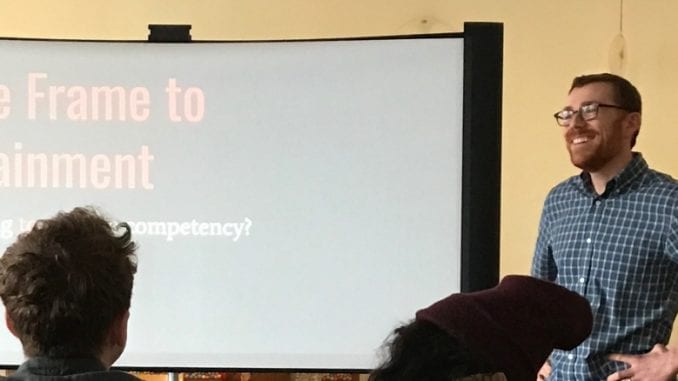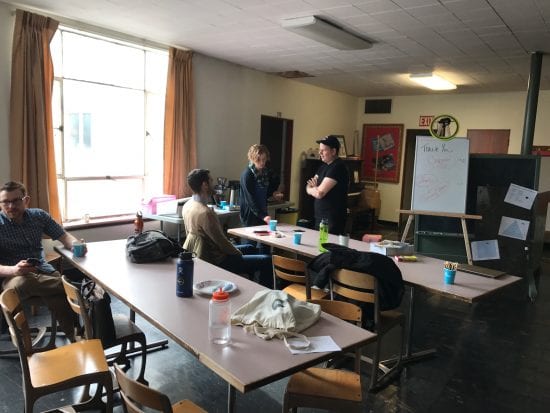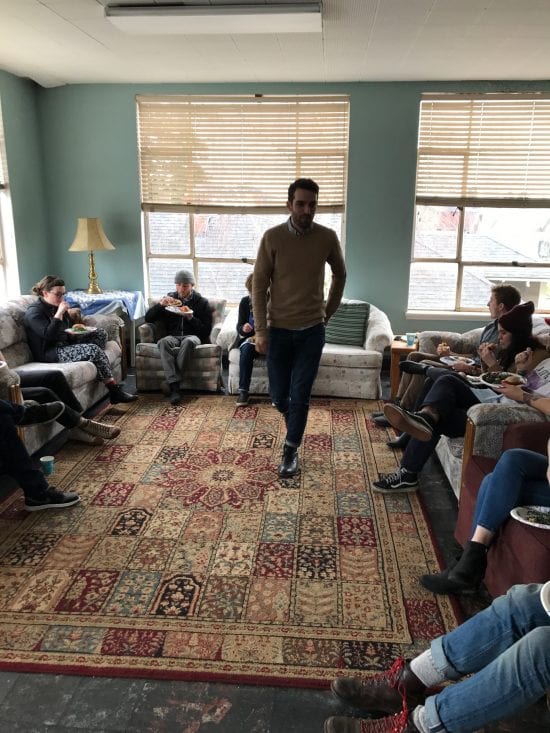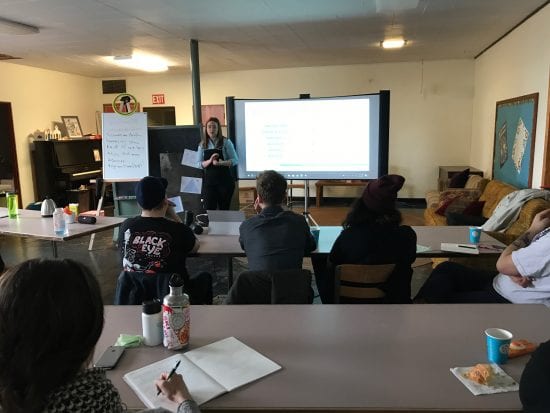
There’s a new barista learning to make coffee everyday, but who are the people teaching them? The Analogy Educators Conference brought together educators from the Pacific Northwest to exchange ideas and provide support.
BY BECKY REEVES
SPECIAL TO BARISTA MAGAZINE
On March 2 and 3, a group of 25 leaders in coffee education from the Pacific Northwest gathered for the Analogy Coffee Educators Conference. Organized by Ben Jones of Batdorf & Bronson, the conference held at Rose City Park Methodist Church in Portland, Ore., highlighted ways that industry educators and trainers can develop and succeed. The event being hosted in Portland meant lots of representation from local shops like Barista, Upper Left Roasters, Dapper and Wise, Water Avenue Coffee, and Portland Roasting, but there was also a large contingent of educators from Seattle companies including Seattle Coffee Works, Caffe Ladro, and La Marzocco.
Day one started with donuts and, of course, making coffee. The group had a laugh when most of the attendees noted it had been forever since one of us had manually brewed a cup of coffee. Of course, with 2016 U.S. AeroPress Champion Ben leading the ranks, the session quickly turned into an all-out AeroPress tutorial. With so many familiar faces, this gathering had a cozy vibe right off the bat: Attendees caught up with old friends, talked about upcoming projects, and outlined goals for the conference.

Overly caffeinated and stuffed from buttermilk bars, the group jumped in with a discussion about the different types of learners we engage with as teachers. A person who learns by hearing things, for example, might enjoy listening to the whole process of pulling a shot before diving in. Some folks are interpersonal learners, needing conversation and relationships to understand concepts. Other folks are kinesthetic learners, meaning they can’t understand concepts unless they can jump in headfirst and do it themselves. The discussion centered around creating training programs that can be modified to make every type of learner productive and successful. Ben was covertly delivering examples of this by combining different styles of learning into his own lesson. He made sure to repeat his ideas, write them on the board, and get everyone into the habit of discussion-based learning as opposed to lecture-based lessons.

We next reviewed the importance of making trainees feel comfortable and confident. As educators, we are responsible for creating digestible lessons for new hires—ones with objectives and activities. But as Ben pointed out, it’s the less-obvious instructions that form them into stellar baristas. Being prepared and ready to teach, having a clean work station set up, being kind and respectful of your new hires’ needs—these are all lessons new baristas learn through example, not necessarily through direct instruction. The group also hit on the importance of having an objective and being prepared to teach a specific topic, which involves having a plan and staying organized. When the person you are training feels comfortable and confident in your abilities to teach them, it’s easier for them to retain that knowledge you work so hard to provide.
On the second day we turned it around, asking each other what we use as tools to educate. Having competed in the United States for two years, I delivered a presentation about using barista competition as a training tool for our cafes. I discussed how being prepared and confident makes it easier to succeed, and how important it is to focus on how you teach, rather than what you teach. I gave examples of how to use the competition scoresheet as a training tool and guide for setting technical protocols in the cafe. Barista competition has lots of potential to make an educator rethink the structure of their training program. In a sense, competition and barista training both have the same goal: Are you providing the needed amount of knowledge about this experience in a way that is engaging and makes sense?

Next, Andrew Russo of Catalyst Coffee Consulting and Coffee Spanish gave an engaging presentation about creating a training curriculum that makes sense. “In a perfect world, we would have days and weeks to train people the way we want,” Andrew told the attendees. “But realistically, we only have about an hour or two to go over a large portion of the job that gets done.” He focused on the importance of being prepared and having a back-up plan. Not sure if the venue has Internet? Have a plan for that. What if the cafe you’re training at isn’t completely built out? Have a Plan B in place just in case. He matched discussion of being extra prepared with horror stories of his own, giving new depth to the phrase, “Trust me, I learned the hard way.” He ended his presentation with an excellent point about understanding your audience and your tools. The lesson you have prepared for one person might not work for another. “It’s about them, not you,” he said.
Later in the day, Ben started an exercise in giving positive feedback, posing simple statements to the group and inviting us to agree or disagree. We discussed a lot of topics in this format, from the coffee service model and behavior strategies that are beneficial for making tips, to the idea of whether or not customer service can be taught at all. We went around the room and told our own training horror stories. We also reflected on ourselves as educators and talked about how Myers-Briggs personality types could help us with our own understanding of our unique training styles.
As educators, we all have the same goal: to equip baristas with the confidence and knowledge they need to deliver high-quality beverages and service. To be surrounded by peers in coffee education was an amazing opportunity to reflect and learn. Being in a group with people with a common goal left us all feeling invigorated and ready to go back to our cafes and practice what we’d learned. Ultimately we took from the Analogy Coffee Educators Conference the importance of meeting people where they’re at, and respecting their time, needs, and intelligence. Everyone deserves the chance to succeed, and it’s up to us as educators to give people the tools to do so.
 ABOUT THE AUTHOR
ABOUT THE AUTHOR
Becky Reeves is a barista based in Portland. She’s the co-founder of Women Investing in Northwest Coffee Champions (WINCC), which provides tools and resources to female and minority coffee competitors. Her ultimate dream is to compete on a coffee version of Cutthroat Kitchen.

